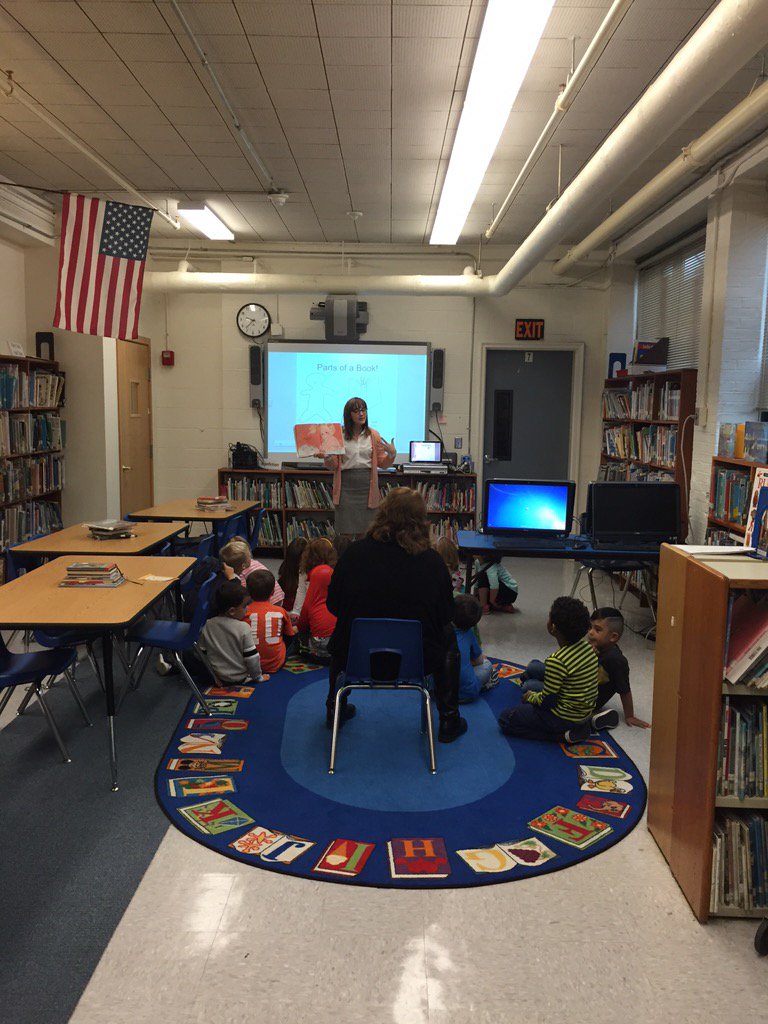Woah, we're flying through the school year, with October already behind us! We had a great month in the elementary libraries - we went on
scavenger hunts, we read
silly stories, and we firmed up what we know about the differences between
Fiction and Nonfiction.
Kindergarten - Grade 2
With the youngest library detectives, we're starting the year off with practicing how to use the library and our books. In order to learn how to be responsible for our books, and take care of them properly, we first need to know the
Parts of a Book.
First, we read
Here Are My Hands by Bill Martin, Jr. and John Archambault.
 |
Click on the picture to find this title in the Stevens Memorial Library catalog!
|
We got a chance to move our bodies a bit while reading this book - when we heard the word "hands" we waived our hands in the air! When we heard "feet" we stomped our feet!
Afterwards, we talked about the parts of our bodies and how books have parts to them too. We talked about how the covers help protect the insides of the book just like our skin protects us. We talked about how the book's title can tell you what kind of book it's going to be (a happy book! a scary book!) just like a person's face can tell you what kind of mood their in (grumpy! excited!). We talked about how both people
and books have spines, and that spines help keep us standing straight and tall. Book spines also have
the secret code so it's important that when we put library books back,
the spines are always facing out!
Next, we talked about the rules for the inside of the book, where we learned that
you have to read the words on the page...no matter what! That's when we read
The Book With No Pictures (click on the link for a recommendation!) by B.J. Novak.
Grades 3-5
In the older grades, we've been making sure we're experts in what constitutes fiction and nonfiction before we move on to how to use both kinds of books in our daily lives. It's challenging, not only because of the language ("non-fiction" sounds a lot like it should mean "not real"), but because it seems like our older grades have trouble distinguishing
historical fiction (fiction that uses real facts to tell a made-up story) from
non-fiction (real facts, nothing made up).
First, we reviewed what Fiction and Non-fiction mean - what are the parts of a fiction story? What about the parts of a non-fiction book? After a review - including reinforcing what we know about the
SECRET CODES - we had our first
Fiction & Non-fiction Challenge!
 |
| See those piles of books on the tables at Kittredge? They're part of the challenge! |
Early in the morning, I covered up the spine labels (a.k.a. the Secret Codes) of a bunch of books, and placed piles in the middle of the tables at each library. After our review, students broke into five different groups, and each group had to make a pile of the books that were fiction, and the books that were non-fiction - all without using the secret code! They had to look
inside the books (because you can't judge a book by its cover, after all!) to determine what kind of book they were. It gave us an opportunity to talk about historical fiction, biographies, and a few other genres that were a bit tricky! By the end, the kids were feeling more confident than ever about knowing the difference between fiction and non-fiction.
Next up: Kindergarteners start to learn about authors, younger grades learn all about book care and the "No No Never" Box, 3rd grade starts a discussion about online safety, and the older grades discover all the amazing resources our libraries have online!
See you later, Library Detectives!


